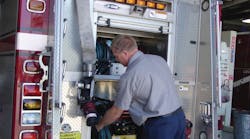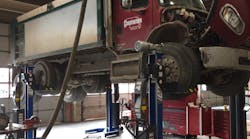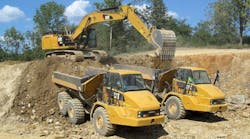Disposal of vehicles and equipment is, for most organizations, a tedious process involving various areas of expertise. This includes accounting, knowledge of market resale averages, legal and liability constraints and the ability to choose a viable process.
Live auctions have constituted a major method of equipment disposal for decades and have often been favored in lieu of trade-ins by many larger organizations since they are not tied to the purchase of a new machine and bring a larger interest and subsequent selling price when many items are auctioned off at the same time.
Smaller outfits, however, with only a small number of pieces of equipment for sale each year, continued to benefit more from the trade-in approach since quite often, personnel were lacking to coordinate the process and results did not tend to be highly cost-effective. The advent of online auctions has reduced staff work load and leveled the playing field for organizations regardless of size.
The City of Abilene owns approximately 1,200 vehicles and pieces of motorized equipment, with about one-third of this fleet consisting of trucks, large specialized units and construction equipment. Between 50 and 100 units are sold at auction every year.
In earlier years, auctioneers were generally picked from the local pool, whose followings consisted primarily of junk dealers, local auto resellers and local citizenry. In the mid-1980s, however, standardized auction bid processes were established and professional auctioneers with larger followings entered the equation.
These auctioneers after they submitted proof of a history of conducting vehicle and motorized equipment, as well as general auctions, on a national basis.
Auctions were held annually and the Purchasing Division was responsible for developing and coordinating the bid process and setting the date. Auction sites were the city's Civic Center exhibit hall for smaller equipment and the Civic Center parking lot for vehicles and larger items.
The auctioneer stood in a pickup bed while calling the auction, and one or more staff members would be at his side to provide clarification and general information as needed. One of the advantages of conducting live auctions was the easy one-on-one interaction between staff and the auctioneer during the auction, which enabled ready communication and quick resolution of potential problems.
A potential concern was that the auction could only be scheduled when both the Civic Center facility and the auctioneer were available.
Liability was another issue, since the public had extensive access to the equipment while it was sitting overnight in a relatively unsecured parking lot. Keys sometimes disappeared just prior to an auction, decreasing interest in the item since it could not be started. As a result, a locksmith was hired to be on standby during the auction.
Taking the show onlineOne of the primary reasons for Abilene's decision to go with an online auction process, in addition to reducing liability and site costs, was the lack of storage space.
As a rule, new vehicles generally arrive between December and January, followed by dump trucks and construction equipment in March and April. However, the auction to dispose of the items that had been replaced would be held between late July and early September. During that time, auction items would sit idle on the fleet services parking lot while continuing to depreciate and take up valuable space.
Purchases with long lead times, would often be delivered in mid-September or October, which meant the phased-out units would sit in the parking lot for an entire year until the next auction.
With online auctions, there is no need to store equipment for months or years.
When selecting an online auction service, there are several considerations to be weighed. For live auctions, the actual vehicle is available for inspection and those who travel to the auction can view it prior to bidding. This can create more enthusiasm and seeing other bidders face to face often generates a 'fever' for the purchase. With an online auction, not everyone will make an inspection trip on days provided for the online auction.
In some ways, live auctions are easier to administer because money is collected is on-site. On the other hand, Internet auctions furnish an almost unlimited viewing base, potentially in the millions, and the more viewers, the more customers. However, Internet auctions require primarily long-distance interaction where crucial information can be lost in translation. Emails and phone calls do not always lend themselves to good communication.
We initially explored the possibility of auction intermediaries, companies that, for a fee, pick up the auction units and take them to one of their network of on-site auctioneers. Although that approach would have eliminated the problem of prolonged storage, it increased the cost of conducting the auction since both a fee to the auctioneer and a fee to the middleman would be required. Added to that would be the cost of hauling the equipment to wherever the auction was taking place.
A request for proposal (RFP) was developed by the staff that incorporated the terms of the online auction, handling of documents, liability issues, computer and online access requirements, transfer of titles, and payment requirements. The RFP process also included interviews with prospective auction companies, a demo of their processes and a list of average auction returns for various pieces of equipment.
Once a choice had been made based on the best overall profile, meetings were held with the auctioneer to develop the specific plan of action. The first online auction was held in February 2007 and a second was held in April. Altogether, a total of 118 pieces of equipment were sold between the two events, including 32 vehicles (pickups and patrol sedans), a motor grader, a wheel loader, an asphalt recycler, a truck-mounted sweeper, a sewer camera van, six dump trucks, and four solid waste trucks. The remaining equipment consisted of trailers, large mowers and other miscellaneous items.
The auction return for the vehicles, wheel loader and sweeper was equivalent to what we had experienced in the past during live auctions, but the return on the motor grader and solid waste trucks was more than double what had been realized before for the same type of unit in the same condition. Dump trucks also fared slightly higher than previous averages, as did the mowing equipment, trailers and smaller items. No history had been established for the camera van and asphalt recycler. A third online event is being planned for the near future.
In spite of a few snags, the City of Abilene found the online auction process relatively seamless. The vehicles were detailed prior to taking pictures for the online auction, and all the other equipment was cleaned to maximize its appearance. It also helps to submit all known mechanical problems, and it's essential to disclose accident damage information to potential buyers.
We have added directions to our physical pick up site on the Internet because we got a flood of phone calls for this information at the end of the first auction. Reconciliation of audit returns was also time-consuming due to the volume of units sold at the same time. In the future, we plan to auction off equipment and vehicles as they are replaced.



